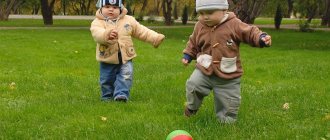A child’s personality is formed in the family where he grows and develops in the first months of his life. Parents become the main ones in his upbringing. As the baby grows, he begins to learn about the world and himself, all this helps in his development. And communication is a consolidating factor that is accepted in society.
An adult is a product of upbringing who acquired his first personal qualities and skills in the family of his parents. Only then do the people around you, educators and teachers, friends and society as a whole, join the process. Undoubtedly, the child changes under the influence of the people around him. But the foundation for it is laid by the parents, whom the child considers all-knowing and correct.
At first, parents are concerned only with the growth of the baby, who gradually begins to remember, study and learn them. Then awareness arises when the child begins to control not only his body, but also his thoughts. When the child becomes aware, the parents move on to educate him. However, it is upbringing, according to the online magazine psytheater.com, that can become destructive in the development of a child’s personality.
What do parents do when they have children? They raise them, look after their health, feed them, and clothe them. But that is not all. Parents, in addition to satisfying all physiological needs, are involved in education. The same applies to training, when knowledge is given. Education and training develop different areas of a child’s personality, but are aimed at the same thing.
What is education? This is human programming. In other words, parents are simply programming the child for the life he will later live.
Mom and dad practically deprive the child of the right to decide for himself what kind of person he should be, what to do, what to do in a given situation, what to do with himself, with whom to communicate, etc. Adults continually tell their children what not to do. and what is possible, what is good, what is wrong. All this is programming: what to be and what actions to perform in a given situation. And this is called the beautiful word “education.”
The same thing is done by training, which gives specific, clear and unambiguous knowledge to people, unspokenly saying: “It can only be this way and no other way!” Anything that contradicts this knowledge is absurd!” People get into violent arguments when their knowledge and opinions do not coincide. Each of them considers their knowledge to be the only correct one. And none of them sees that perhaps they are all right.
Education deals with programming each person for a certain way of life. While the child is small, he does not question everything that is told to him. He obeys and trusts his parents completely. But mothers and fathers themselves do not always understand what they are trying to program in their children and how it will later affect their lives when they grow up.
Fears, complexes, internal prohibitions, beliefs, direction of thinking, behavior patterns, etc. - everything is brought up in children by parents. That is why it is already customary to say that absolutely all children are crippled by their parents, who themselves are notorious, insecure, fearful, uptight people who do not know everything.
What is the formation of a child’s personality?
The family plays an important role in shaping a child's personality. What it is? This is an impact on the baby that will contribute to his socialization, self-development, and formation as a person. It is worth noting that all people grow up differently, which means that parents resort to different methods of education.
One of the development techniques is imitation. The child simply copies the behavior and character traits and thoughts of his parents. There are various methods of raising children. And they are all attractive and effective in achieving certain results. However, there are universal methods that function regardless of the wishes and aspirations of the parents.
One of these methods is called imitation. Notice how in nature, adult animals teach their children the art of survival. The mother goes out hunting with her cubs and herself demonstrates how to catch prey, eat this or that grass, lick their lips, etc. The mother, by her own example, shows what her children need to do in order to survive. The same principle applies among people, but not everyone remembers it. The child carefully watches his parents and repeats everything they do. At the same time, he does not analyze their actions, because he believes that since his parents do this, it means it is useful in order to survive.
For example, young mothers let their children play in the sandbox, while they themselves smoke and drink on benches, discussing some topics. Children look at all this and remember. Should we then wonder why, over time, these same children begin to smoke and drink? As parents behave, so will their children.
The only way to teach children, as well as other people, is by example. Children should not be raised. Nurture in yourself what you want to instill in your child. He will look at you and copy your behavior.
Stages of raising a child:
- A parent has his own character.
- The child begins to respect his parents.
- Respecting, the child imitates his parents.
- The child asks some questions.
- Parents give advice unobtrusively.
In order for your child to listen to your opinion not only in preschool age, but also after, you should instill in him an inner feeling of respect. Once this feeling is achieved, your child will begin not only to imitate you, copying your actions and character, but also to listen to your opinion. It is very important to allow your baby to retain in his heart the feeling of love and respect that he feels for his parents, so that later he can influence his character development and regulate his behavior.
During the development process, the baby is not able to evaluate his actions and words, so he performs certain actions, paying attention to how his parents react to them. Depending on their reaction and the educational measures that will be applied to him after each committed act, the child develops certain habitual patterns of behavior.
Parental love
Parents are the most important subjects of human education. It is no coincidence that in difficult life moments we mentally turn to our parents, especially mothers. The specificity of the feelings that arise between children and parents is mainly determined by the fact that parental care is necessary to maintain the life of the child. The need for parental love is truly a vital need of a young person. And if in the first years of life, parental love ensures the life and safety of a person, then as the child grows up, parental love increasingly performs the function of maintaining and ensuring a person’s inner, emotional and psychological world. Therefore, the first and most important task of a parent is to create confidence in the child that he is loved and cared for.
And yet, the emphasis on the need to create trust in parental love in a child is dictated by a number of circumstances. It is not uncommon for children to be separated from their parents after they have grown up. They separate in a psychological, spiritual sense when the emotional connection with those closest to them is lost.
Psychologists have proven that behind the tragedy of teenage alcoholism and drug addiction are often parents who do not love their children.
The most important condition for raising a family is the need for love. But here it is very important to understand - it is necessary for the child to feel, understand, be sure that he is loved, to be filled with this feeling of love, no matter what difficulties, clashes and conflicts arise in relationships with parents or in relationships between spouses. Only with a child’s trust in parental love can a person’s personality be correctly formed, only on the basis of love can moral behavior be cultivated, only love can teach love.
The phenomenon of parental love is called the emotional attitude of parents towards the child. In the continuum of the meaning of the emotional attitude of parents towards a child, several options for attitude can be distinguished - from the unconditionally positive to the frankly negative pole:
unconditional emotional acceptance of the child. Unconditional acceptance implies that parents differentiate the child’s personality and behavior. A negative assessment and condemnation by parents of certain actions of a child does not mean a denial of the emotional significance of the child and reduces the parents’ self-esteem in relation to the child’s personality. This type of emotional relationship is most favorable for the development of the child’s personality, as it fully satisfies the child’s needs for safety, love and care.
conditional emotional acceptance. In this case, the child must earn it through his achievements, exemplary behavior, and fulfillment of requirements. Love acts as a benefit, as a reward that does not come on its own, but requires work and diligence. Refusal of parental love is a fairly frequently used method of punishment in such cases. This attitude of parents causes fear and a feeling of insecurity in the child.
ambivalent emotional attitude towards the child.
indifferent attitude. This attitude is based on an incorrect maternal position, infantilism and personal immaturity of the parents themselves).
latent emotional rejection.
blatant emotional abandonment of a child.
Formation of a child’s personality in the family
What is personality? This is the result of cultural, social and educational influences on a person. No one is born an individual. However, as one acquires knowledge, experience, develops character traits and skills, a person becomes an individual, a personality.
There are two aspects to the issue of child formation:
- The child's awareness of his place in the world. How to recognize that he has reached his development?
- The child understands the pronoun “I” and uses it.
- The child is able to control himself.
- The child is able to separate things into “good” and “bad”.
- A child can talk about himself: appearance, character, abilities, internal thoughts, sensations, experiences.
- Development of feelings and volitional sphere in order to develop certain qualities and behavior patterns.
A child becomes a person no earlier than 2 years of age, since until this time he is primarily concerned with his physical development. Self-awareness comes from the age of 3. And by the age of 5, the child stands out from the rest of the children, which makes him an individual.
Neighbors, friends, school, advertising, society as a whole undoubtedly have their influence on a person who is gradually changing. However, these changes will be minor. The foundation is laid in the child by his parents, who surround him in the first years of life. He takes their example, imitates, copies them. That is why, over time, it becomes noticeable that the child behaves in the same way as his parents.
The family is an intermediary between society and the child. Parents themselves succumb to the influence of society, absorbing moral, ethical, cultural and other foundations. Then they pass them on to the child. But still, upbringing in each family differs for the reason that each parent has not learned everything, but only certain principles of society.
- In the first year of life, parents are only concerned with the physical development of the child.
- In the second year of life, you can introduce the child to social principles.
- After reaching 2 years of age, it is necessary to instill moral principles in the child.
- After 3 years it is necessary to insist on their observance.
Nurturing personal qualities in a teenager
It is no secret that all people know from their own experience that the most difficult and difficult age is adolescence. By this period, he already has all the makings of a personality and his individuality has been formed. But it is impossible to say that the process is completed yet, since adolescents are actively developing and creating their spiritual and moral consciousness. Of course, by this age he already knows about the norms of morality and ethics accepted in society, but the adoption of these norms occurs precisely during puberty.
The role of the family in the formation of the spiritual and moral personality of a teenager is quite significant; it is worth talking tirelessly and unobtrusively with children on this topic. Family conversations, if they are confidential and without coercion, can have a strong influence on the child’s internal attitudes
At this stage of life, it is important not to lose the connection and trust of your child. Teenagers involuntarily look for their place among other peers
They do not always find themselves in companies with high moral standards, and there may be a misconception about the norms of morality and spirituality, leading to deviant behavior. In other words, the main influencing factor on the development of a teenager’s personality is the approval and acceptance of his peers, and parents should not openly and negatively criticize this aspiration, and especially his friends. It is worth understanding this dependence; it will not be possible to avoid outside influence, so you need to accept it as a factor that will have an impact on the child’s personal manifestations.
It is important to be able to build a new trusting relationship with your child. New not because the connection is broken, but because interaction and communication move to another level
It is important for a teenager’s personality to be heard, taken into account and consulted. He has a clear conviction that he is old enough and can make his own decisions. You need to be able to give him this feeling, show him that the family and the child are inseparable, but at the same time, he already has the right to a lot.
There cannot be general advice on how to raise a teenager, since each person needs his own approach and methods of influence. But the age patterns are almost the same for everyone, and during this period it may seem that the influence of the family on personality development is losing its position a little. In fact, it is worth changing your parenting methods and treating your child with respect and understanding.
Education and formation of a child’s personality
The family is the first environment in which the child’s personality is formed and nurtured. Parenting differs in every family because it is based on the beliefs, fears, character traits and behavior that the parents themselves possess. Don't forget that all people are different. So it turns out that two (or one person, if there is no second parent) individuals with their own unique set of all psychological qualities create an environment for the baby in which he will grow and develop.
The environments are created different, therefore the personalities are raised different. The main tenet that parents should adhere to should be love. And the fact that a child goes through a system of rewards and punishments is a natural process of education.
It is worth noting that parents themselves are not ideal people. Therefore, they are unlikely to be able to raise an ideal child who will always do everything right. In the process of parenting, parents often make mistakes that they may not even be aware of.
With the advent of such concepts as success and leadership, scientists have seriously taken up the issue of eliminating the causes that make a person unhappy and poor. As it turns out, a lot depends on the upbringing that absolutely all people go through. Old methods cultivate in children those habits and qualities that their ancestors previously possessed. But they did not live richly and happily. It turns out that parents instill immaturity, sacrifice and a sense of self-doubt in their children. This makes it difficult to achieve success in a modern world that welcomes human leaders.
Formation of interpersonal relationships in preschoolers
Why in psychology they talk not only about communication, but also about interpersonal relationships. Essentially, the same process of interaction between two or more people is implied.
But when using the term “interpersonal relationships”, they focus on how in communication the personality, the individual self, is revealed (or, conversely, closed, fenced off) and developed.
The interaction of preschoolers moves to the level of interpersonal relationships at the moment when a personal motive appears in the foreground in communication.
The child no longer just wants to spend time with someone, but specifically wants to play with “the girl from the next apartment”, “with boys, not girls”, go to the zoo with his brother, and not with a group, etc. That is , for a preschooler, specific individuals with their qualities and character acquire significance.
Interpersonal relationships for preschoolers are an opportunity to spend time with likeable people, as well as an opportunity to learn to evaluate another person and form ideas about themselves based on comparison. And for this, the communication partner must arouse interest, certain feelings, and have some experience.
Most preschoolers are focused on positive interpersonal relationships. Therefore, they are more likely to agree to a secondary role in the game than to refuse to play at all. If you need to give your toy, the preschooler, although with regret in his soul, will still hand it to his peer. Although exceptions are often observed, especially in early preschool age.
Forms of interpersonal interaction in preschool children
In the interpersonal relationships of preschool children, the following positions (forms) are observed:
- humane
- selfish
- competitive
Children with a humane attitude help their peers, share toys, invite them to play, and speak positively about the results of other children’s activities. Such preschoolers notice the mood of their peers and support them in case of failures. They don’t show off themselves and their achievements. The child's humane position is expressed in the manifestation of moral qualities and benevolent behavior towards others.
If a child is guided by an egoistic position, he will not even remember the names of the children with whom he just played. But he will know what wonderful toys his peers have. Such a child will never give his favorite toy to another, but he can take someone else’s without permission. A selfish child remains indifferent to the feelings and mood of his communication partners.
A competitive position is chosen by preschoolers who strive to be the best. They react painfully to the successes of other children. In order to express themselves better, they can be generous and sympathetic.
Each of the listed positions is appropriate at a certain age stage. A selfish position is often found in 3-4 year old children who have not yet formed moral criteria.
Children aged 4-5 years are distinguished by their competitive position. Preschoolers of this age amusingly praise themselves and highlight their achievements. In older preschool age, a humane position is already the norm.
If a child is selfish and has a strong desire to compete, it is very important to patiently instill in him humane guidelines in relationships
What 7 parenting mistakes do scientists identify?
- Parents do not allow their children to take risks.
Lack of risk leads to ignorance of the realities of life. The world is not simple and not nice. If parents constantly look after and care for their baby, giving 24-hour protection from any troubles, then they develop arrogance and low self-esteem in him.
The child must fall and kick his leg in order to understand what follows his actions. A teenager must endure the suffering of his first failed love in order to mature emotionally. By taking risks, trying, getting into different situations, he learns about real life.
- Parents rush too quickly to help their child.
Trying to help every time, in the very first second to begin to correct mistakes and solve all the consequences of the child’s actions, mothers and fathers develop helplessness in him. Firstly, the child begins to think that in case of failure, someone will always solve his problems. Someone will definitely clear up the unpleasant consequences. In ordinary life, no one is going to help an adult. If a child does not learn to solve difficult situations on his own, then he will be unadapted to real life.
- Excessive enthusiasm.
If parents admire their son/daughter for any reason, this leads to increased self-esteem. This direction has become encouraged in recent years. However, research shows that children begin to lie, cheat and exaggerate when they realize that only their parents admire them and others do not see anything special about them. The inability to face difficulties and perceive themselves adequately forces children to look for other ways to obtain familiar and pleasant delight.
- Encourage everyone without exception.
The inability to show children the realities of life leads to the fact that they inadequately evaluate their own actions and words. Parents often want to praise their child who has done a good deed, but not deprive other children of praise who have done nothing to achieve success. Children stop seeing the need to make efforts and work, even if they are praised even in the absence of achievements. The understanding of cause-and-effect relationships is lost when in the real world a person achieves success only after doing something for his sake, taking action, limiting his desires and straining if necessary. Parents should learn to say “no” and “not now.” Praise only for the fact that your son/daughter has achieved some (even small) success.
- The desire to edify and teach, and not to discuss mistakes.
Adolescence becomes an important moment in everyone’s life, when there is a desire to leave the care of parents and start living in real life. Mistakes, bumps, wrong actions and unpleasant consequences are inevitable here. It is important not to teach, not to force a child to give up committing bad actions, not to protect the child from real life, but to allow him to “get into trouble” while discussing the events that are happening. Parents can share their own experiences when they themselves first encountered similar difficulties to those faced by their child. But it is important not to force the child to obey, but to listen and decide for himself what to do next. He may not listen to parental instructions - that is his right. He should be allowed to make mistakes, learn from the lessons of life and understand that mom and dad are passing on their experience and conclusions, and not edifying.
- Intelligence is not related to the ability to live independently.
Parents often confuse concepts such as intelligence and the ability to be independent. A person can know a lot, but be absolutely inept in real life conditions. People are often talented in their field, but are absolutely careless in communicating with others, unable to predict the consequences of their actions. A child can be smart, but completely unadapted to real life. This indicates an erroneous upbringing, when he is given knowledge, but does not develop the skills of independent living.
- Don't live by the rules that children should live by.
What children are taught, parents must adhere to themselves. While a child is small, his parents are examples of leaders. How do they live? How are they behaving? What do you do in different situations? He learns leadership from their example. It is difficult to convince a child otherwise, that parents did wrong and they are not leaders in life. If you want your own child to succeed, then you yourself must become successful leaders in the real world. He will copy this and reach the heights of success himself when he becomes an adult.
Features of children's interpersonal relationships
As we see, children’s relationships throughout preschool childhood develop depending on the development of the child’s personality and the instillation of moral standards. Changes occur from year to year, and by the time they enter school, moral standards for many children become the regulator of relationships between people. This is especially true for children with a high level of social intelligence.
What is typical in the relationships of younger preschoolers
The relationships of 3-4 year old children are characterized by selfishness. The child wants to play with exactly the toy that he likes. If a boy loads his car with sand, then, at the suggestion of an adult, he will agree to have his friend in the sandbox help load it, but will not agree to give up the car to him.
For a younger preschooler, it practically does not matter how his actions are assessed by his peers. “You are greedy!”, “Bad boy” - such children’s exclamations fly, if not past the ears, then past sensory perception. In response, the child may say that he will not play with someone who calls him names. And after a few minutes, the children will happily forget about this incident and resume their games.
Children really pay attention to statements addressed to them in middle preschool age. Around 5 years old, the child is sensitive to how peers evaluate him
This largely determines whether preschoolers want to communicate and play together.
At 5-6 years old, preschoolers are very drawn to children who show themselves to be leaders. They strive to gain recognition from the leader, want to be like him, and are interested in his opinion.
Interpersonal relationships in older preschool age
Older preschoolers see a lot and notice how and what their peers say to them. But at this age, children already perceive quite critically the assessment of their actions and performance results from the same preschoolers. The opinion of an adult is a completely different matter. An adult is a great authority for an older preschooler.
Children at this age spend much more time with their peers than toddlers, due to which their communication skills develop.
In a permanent group they develop stable relationships. The older preschooler becomes attached to some children and friendships begin. Communication with others may not interest you at all.
At this stage, we can identify the types of interpersonal relationships of preschoolers by observing communication in a peer group:
- directly personal
- evaluative
- business
They are extremely rarely found in their pure form. It practically never happens that a preschooler only wants to be friends with some children, only wants to play certain games with others, and with others wants to be interested in their opinions and seek approval. All types of relationships are intertwined.
Results of education
No matter how right or wrong the upbringing may be, in the end a person still appears with his own unique set of qualities, beliefs, feelings and habits. Upbringing still shapes personality, but how well it will be adapted to society is another question.
We should not forget that education and development occur most quickly in the process of activity, interaction, and communication. It is not through words, but through actions that certain qualities, thoughts, and feelings arise in a person. Therefore, children should be actively involved in various activities, which will contribute to their rapid development as individuals.










